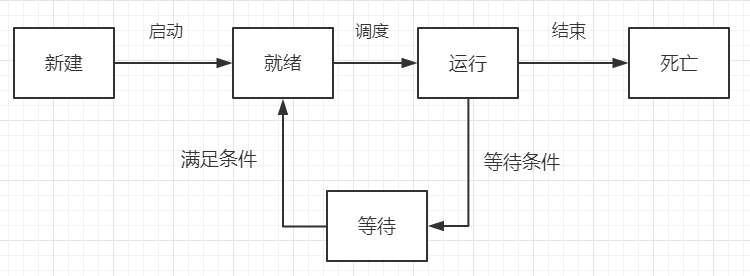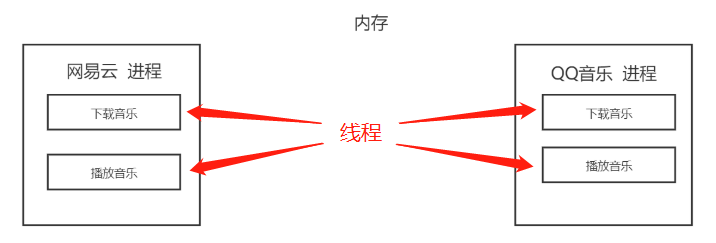Advanced programming skills learning notes
I. progress
1.1 process and procedure
-
Process: executing code + resources used
-
Program: no executed code, it is a static exe file
1.2 process status

1.3 use process to realize multi task
Multiprocessing module is a cross platform multiprocessing module. It provides a Process class to represent a Process object. This object can be understood as an independent Process and can perform other things.
# Creating a process is very similar to creating a thread # You can execute threads and processes separately, and check the differences in task manager import multiprocessing import time import threading def demo(): while True: print("--1--") time.sleep(1) def demo1(): while True: print("--2--") time.sleep(1) def main(): p1 = multiprocessing.Process(target=demo) p2 = multiprocessing.Process(target=demo1) # t1 = threading.Thread(target=demo) # t2 = threading.Thread(target=demo1) p1.start() p2.start() # t1.start() # t2.start() if __name__ == '__main__': main()
-
Thread implements multitasking, which is executed in a code file
-
A process implements multitasking, which is equivalent to copying a whole code file to execute a subprocess
1.4 comparison between processes and threads
-
Process: be able to complete multiple tasks and run multiple QQ S on one computer at the same time
-
Thread: capable of multitasking, multiple chat windows in a QQ (process first, thread second)
-
Fundamental difference: process is the basic unit of operating system resource allocation, while thread is the basic unit of task scheduling and execution

2, Interprocess communication - Queue
2.1. Queue
- FIFO
from multiprocessing import Queue # Create a queue to hold up to 3 pieces of data q = Queue(3) # Store data q.put(1) q.put("juran") q.put([11, 22]) # Queue size print(f'Queue size: {q.qsize()}') # Determine whether the queue is full print(f'Is the queue full: {q.full()}') # Queue full, blocking # q.put({"name": "juran"}) # No blocking, throw an exception directly # q.put_nowait({"name": "juran"}) # Fetch data print('\n Remove data: ') print(q.get()) print(q.get()) print(q.get()) print() # No data in the queue, blocking # print(q.get()) # No blocking, throw an exception directly # print(q.get_nowait()) # Judge whether the queue is full print(f'Is the queue full: {q.full()}') # Judge whether the queue is empty print(f'Whether the queue is empty: {q.empty()}')
2.2 use queue to realize inter process communication
- Save while downloading
import multiprocessing import time def download(q): """Download data""" lis = [11, 22, 33] for item in lis: q.put(item) print("Download to queue complete, Start saving...\n") def analysis(q): """data processing""" analysis_data = list() # Don't know the size of the queue, until the end of fetching while True: data = q.get() print(f'Add to {data}') analysis_data.append(data) # Exit if the queue is empty if q.empty(): break print(f'Save finished: {analysis_data}') def main(): # Create a queue to communicate across processes # q = multiprocessing.Queue(2) # The number of data downloaded to the queue is uncertain, and no value can be filled in q = multiprocessing.Queue() t1 = multiprocessing.Process(target=download, args=(q, )) t2 = multiprocessing.Process(target=analysis, args=(q, )) t1.start() time.sleep(1) t2.start() if __name__ == '__main__': main()
2.3. Note that there is another queue
- from queue import Queue
- from multiprocessing import Queue
from queue import Queue import multiprocessing def demo1(q): q.put('a') def demo2(q): data = q.get() print(data) if __name__ == '__main__': # Normal queue q = Queue() # Implementing multi process queues # q = multiprocessing.Queue() t1 = multiprocessing.Process(target=demo1, args=(q,)) t2 = multiprocessing.Process(target=demo2, args=(q,)) # Report wrong t1.start() t2.start() # If you want the code to run, you have to use run(), but this is not multithreading # t1.run() # t2.run()
3, Multi process sharing global variables
- Processes are not shared, threads are shared
import multiprocessing import threading a = 1 def demo1(): global a a += 1 def demo2(): print(a) if __name__ == '__main__': # process t1 = multiprocessing.Process(target=demo1) t2 = multiprocessing.Process(target=demo2) # thread # t1 = threading.Thread(target=demo1) # t2 = threading.Thread(target=demo2) t1.start() t2.start()

